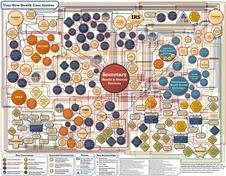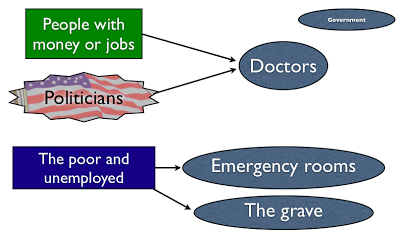This is why you do not give power to Republicans. They’ve made a chart showing how confusing the new US health care system will be.
Developed by the Joint Economic Committee minority, led by U.S Senator Sam Brownback of Kansas and Rep. Kevin Brady of Texas, the detailed organization chart displays a bewildering array of new government agencies, regulations and mandates.
And there’s a rather complex and confusing chart. Gee, that chart has a lot of lines and shapes on it. That might take a while to read.
“For Americans, as well as Congressional Democrats who didn’t bother to read the bill, this first look at the final health care law confirms what many fear, that reform morphed into a monstrosity of new bureaucracies, mandates, taxes and rationing that will drive up health care costs, hurt seniors and force our most intimate health care choices into the hands of Washington bureaucrats,” said Brady, the committee’s senior House Republican. “If this is what passes for health care reform in America, then God help us all.”
Yes, the health care system is a complex system. The economy is also a complex system. A country is a complex system. But to them, complexity is always needless complexity. If it can’t be explained in two minutes to someone with no particular expertise, it’s unworkable and should be dismantled.
The Republican health care chart is much simpler.
Please do not give Republicans control over a system that they’re too lazy and stupid to figure out.



29 July 2010 at 3:41 am
Heh, nice. I've never really delved too deep into politics but I think that our modern society has necessitated a universal health insurance system.
And we can thank the fruits of science for that.
It's only fair that everybody pays their share into the pot. Some people think they can drive around in a speeding cage of metal at 80 mph and not need to insure their body.
If we still lived in the 1800s, I can understand that mandating health insurance would be unnecessary. But now it isn't unnecessary because of modern technology and our morals (ie we intrinsically feel the need to provide medical care regardless of the patient's insurance status).